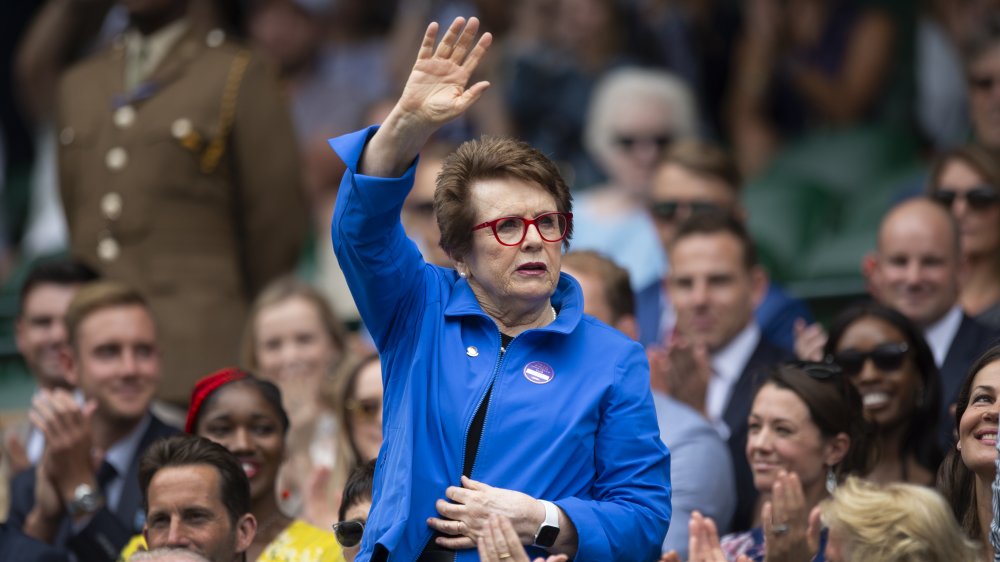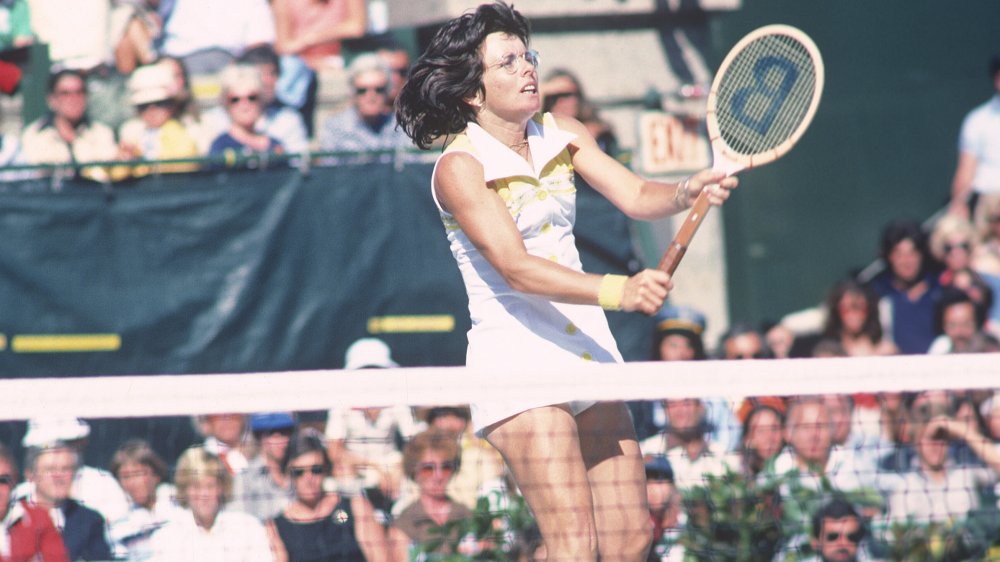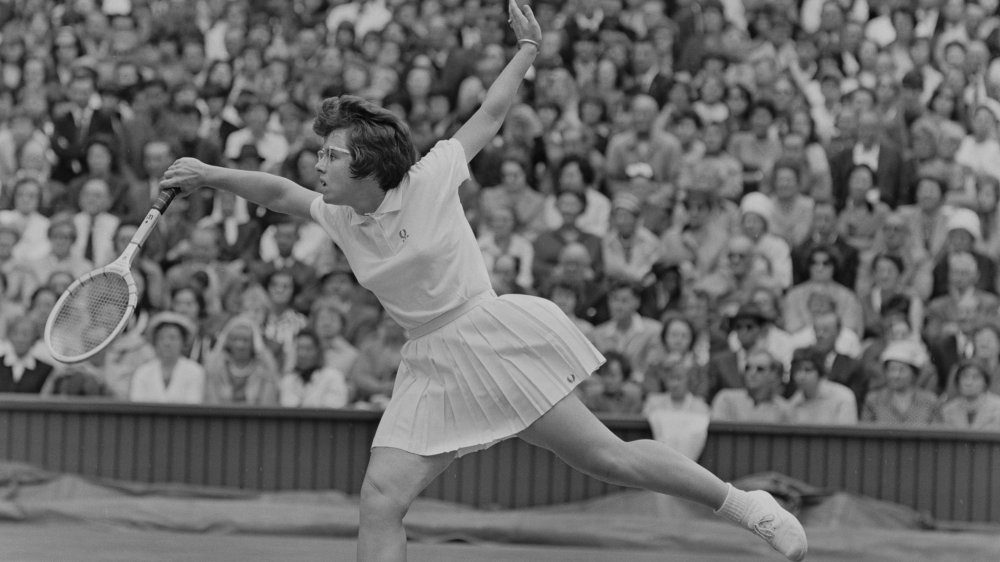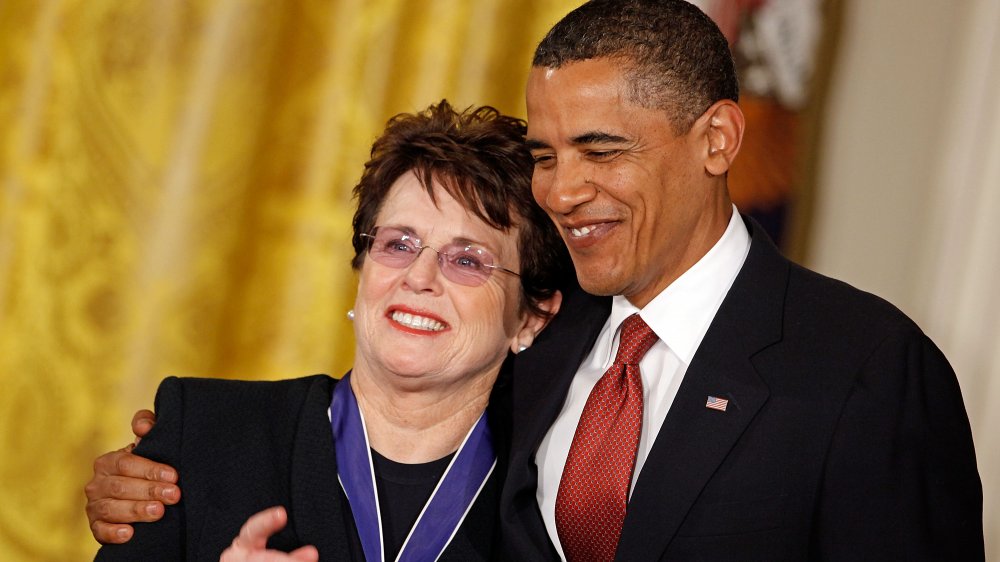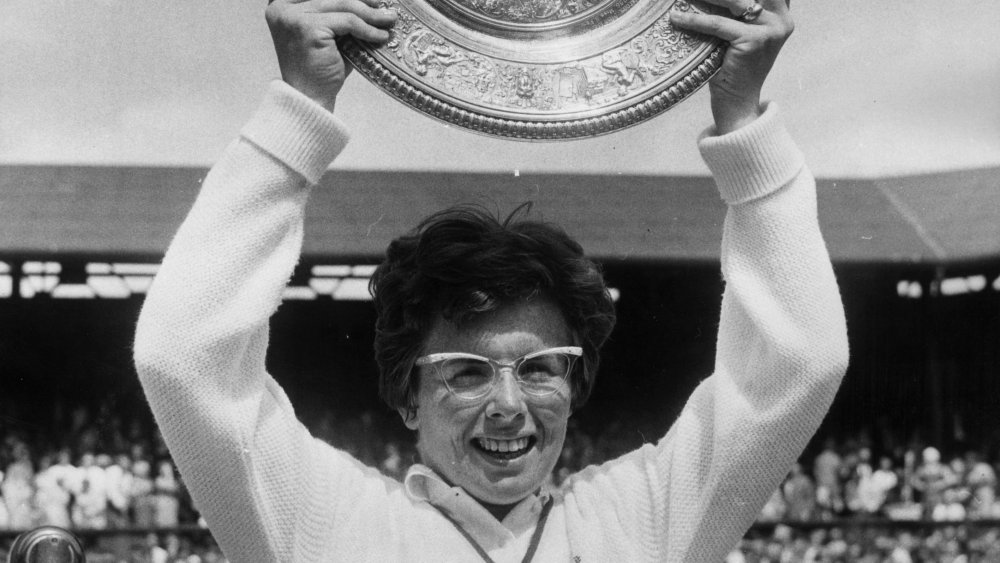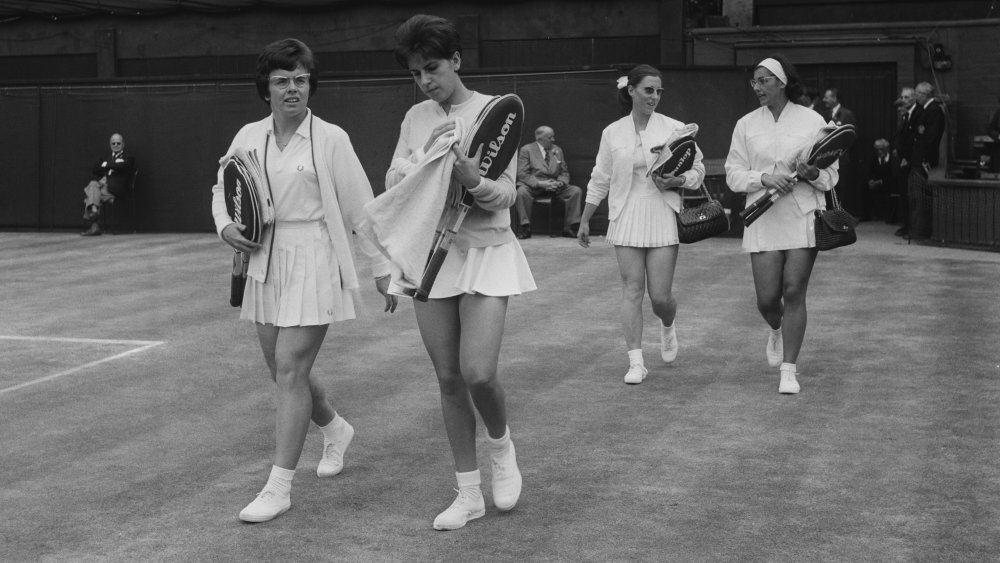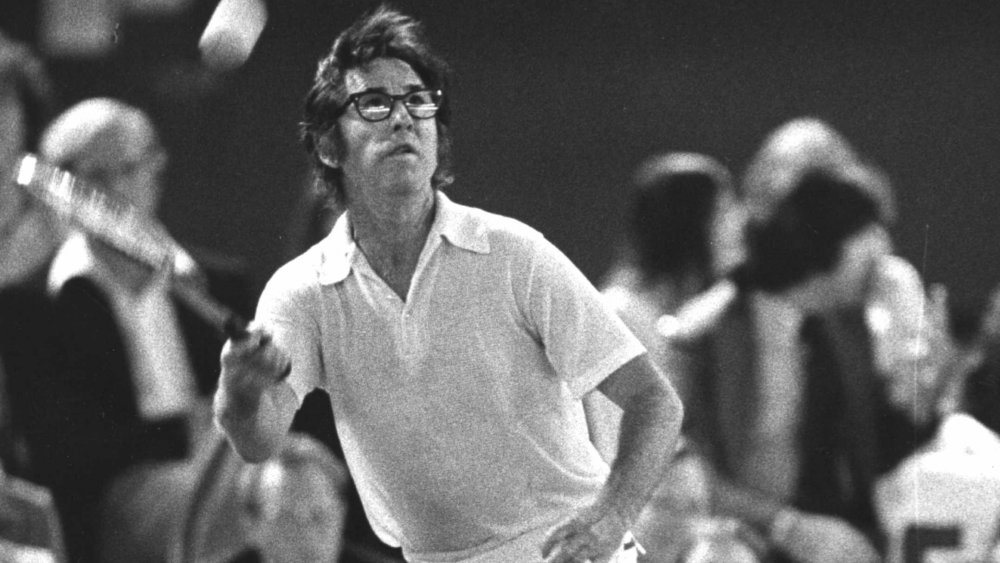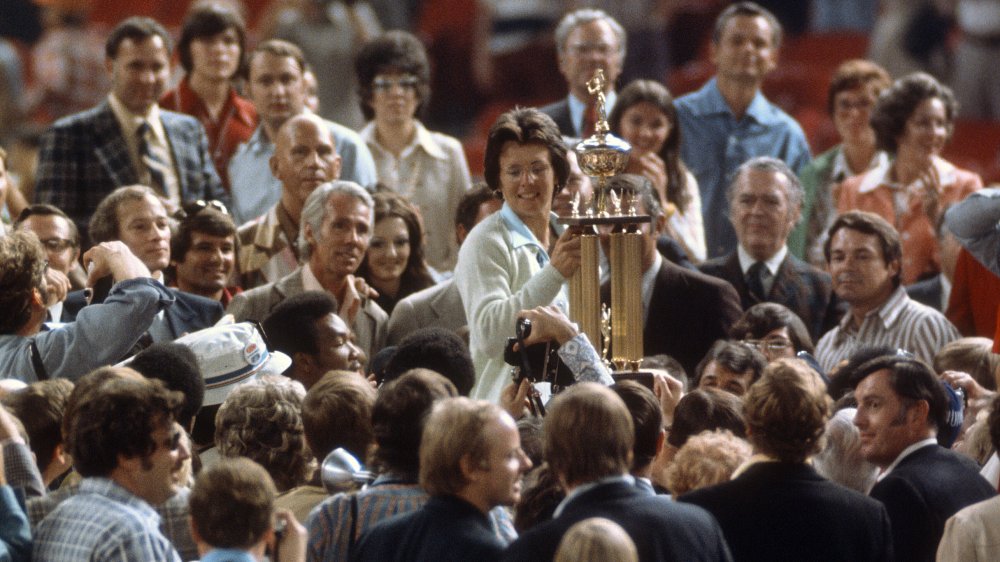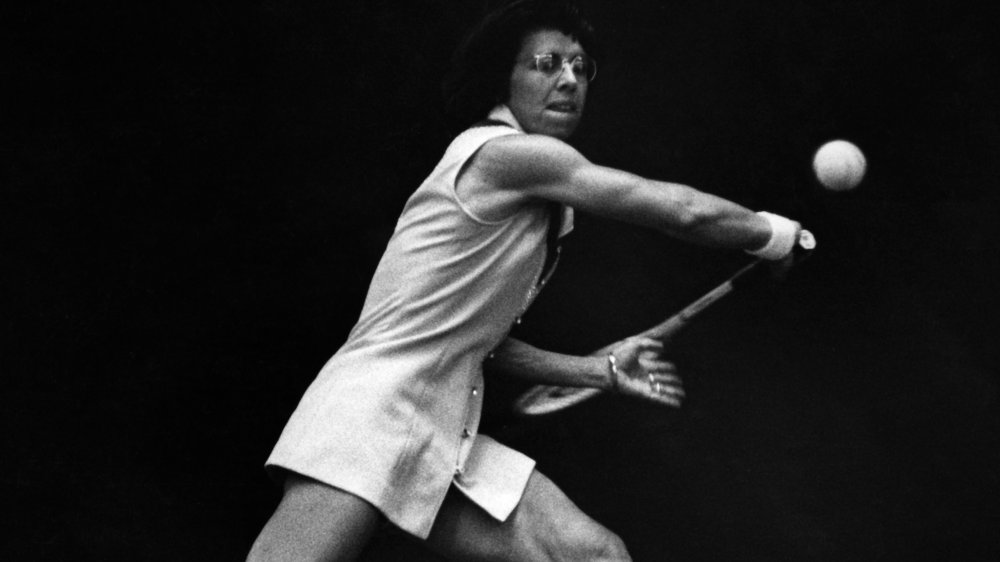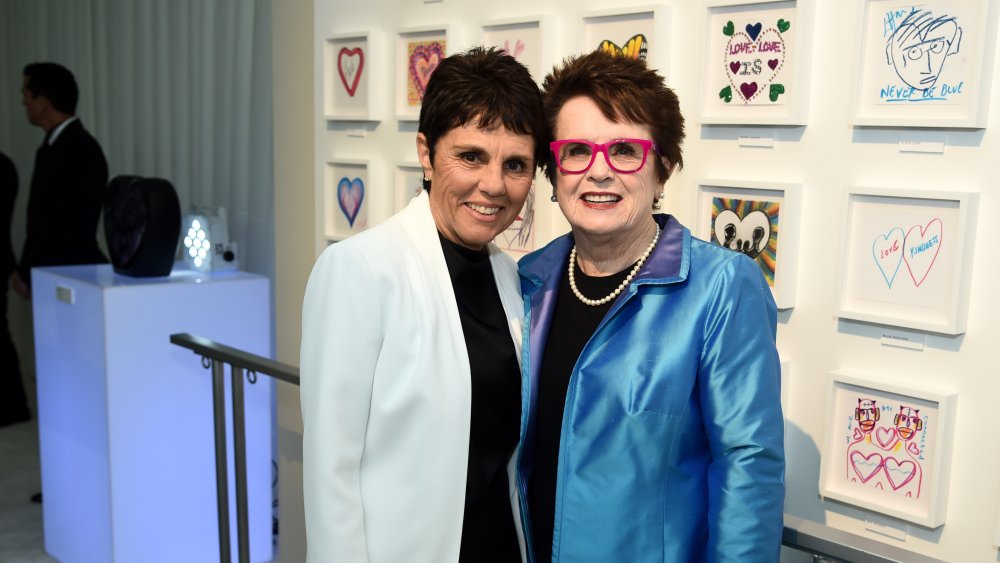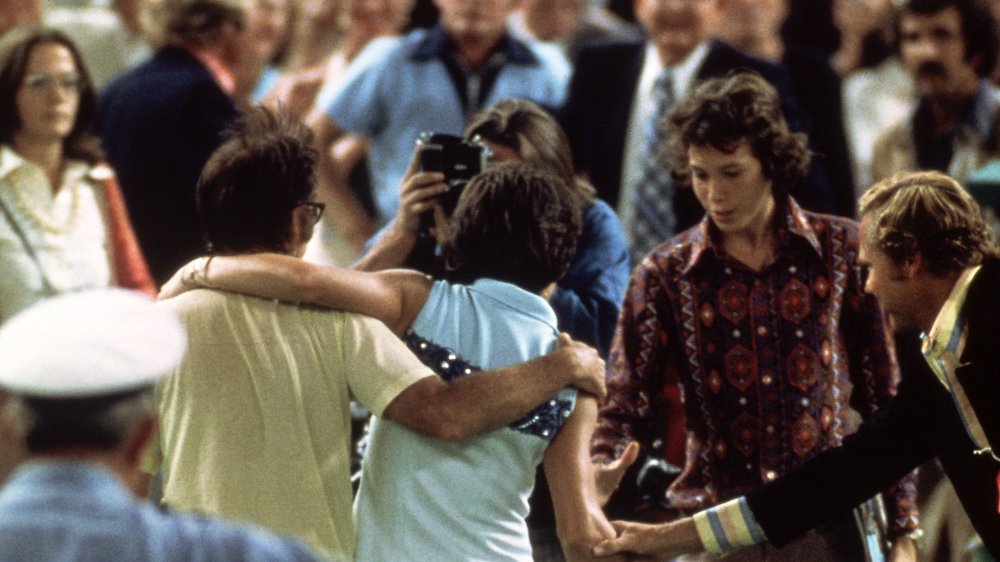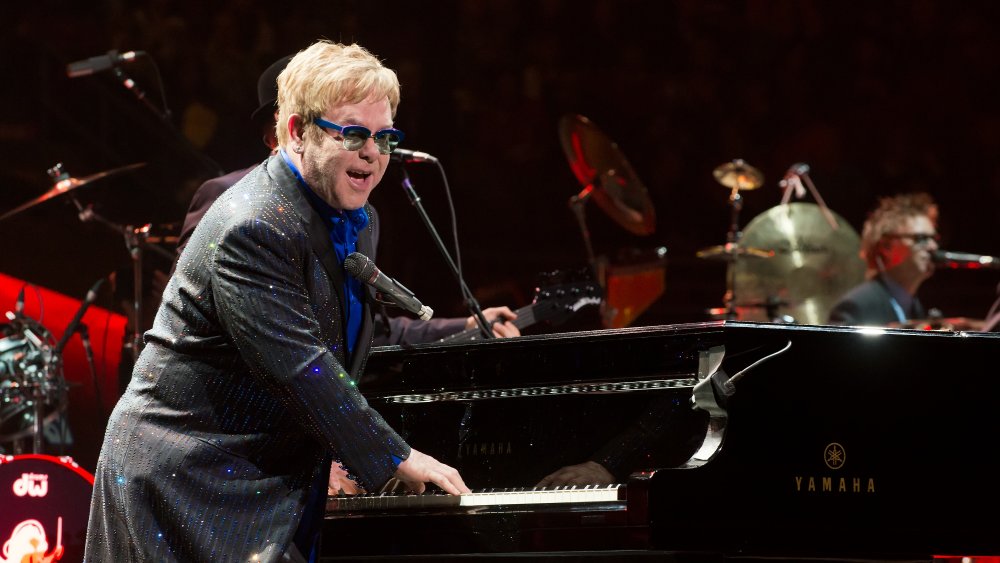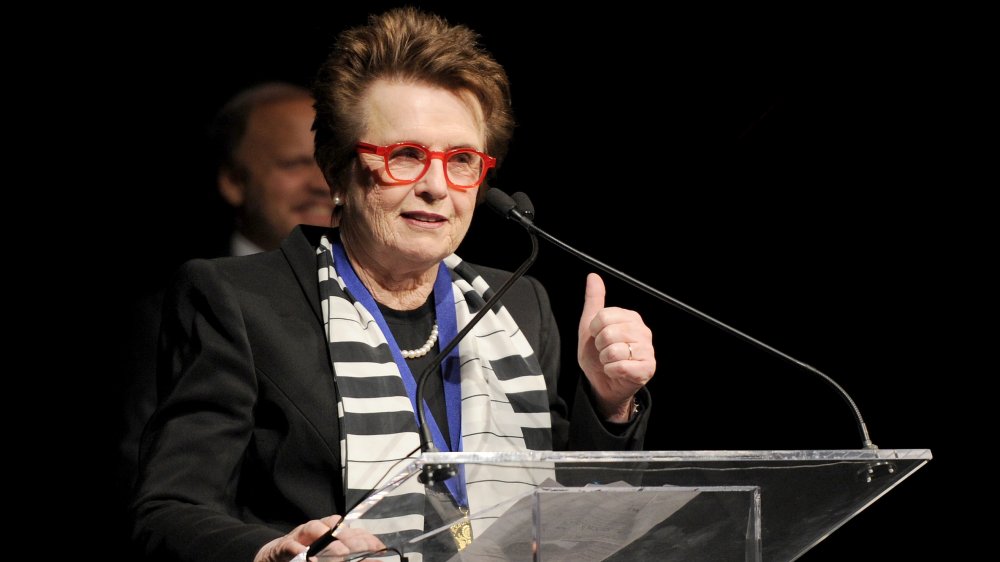The Crazy Real-Life Story Of Billie Jean King
Billie Jean King is known as not only one of the greatest tennis players in the history of the sport but also as a renowned champion of equal rights. King fought long and hard for women to be treated as equals with the same regard as their male counterparts in the sports arena. Later, she became one of the first openly gay athletes and has been an avid supporter of the LGBTQ community. After retiring from tennis, she started a foundation that strives for equality in the workplace for all — regardless of one's sex, orientation, or race.
Billie Jean King is seen as a hero and pioneer for equal rights, but she didn't have an easy time getting her due for herself and her fellow women athletes. It was her past struggles that have paved the way for women and LGBTQ athletes today. This is the crazy real-life story of Billie Jean King.
Billie Jean King didn't start out as a tennis player
Born Billie Jean Moffit on November 22, 1943, in Long Beach, California, she was the eldest of two children. According to PBS, her father was an engineer with the local fire department, and her mother was mostly a homemaker with side jobs selling Tupperware and Avon products. Her parents were highly conservative Methodists, so Billie Jean and her brother had a very religious upbringing. Religion was such a focal point of Billie Jean's early life that when she was young, she thought she might like to be a preacher herself.
But Billie Jean also came from a very athletic family. As noted on Biography, her father played college basketball, her mother was a swimmer, and her younger brother, Randy Moffit, was a baseball player. (He would later become a Major League pitcher for the San Francisco Giants, Houston Astros, and Toronto Blue Jays.) In her early years, the young Billie Jean was actually a softball enthusiast and played shortstop for the local girls' team. She was the only ten-year-old on a team of 14- and 15-year-old girls — her team went on to win the city championship. However, at the age of 11, her parents worried that softball wasn't a "ladylike" enough sport and urged her toward tennis instead.
Billie Jean King was denied a tennis scholarship
Once Billie Jean King discovered tennis, she proved to have genuine talent. As noted by PBS, she won her first Wimbledon doubles title at the age of 17 with her partner, Karen Hantz, making them the youngest team to win. However, she soon got a taste of the inequalities that women faced in sports. She attended California State University, Los Angeles, where she met her husband, tennis player Larry King. The two wed in 1965. According to the Associated Press, Larry King attended college on a tennis scholarship while he studied law. However, Billie Jean had to work two jobs to pay for her college education — despite the incredible acclaim she achieved at Wimbledon, there were no tennis scholarships available for women.
Not only that, but Billie Jean was keen to notice just how very white tennis itself was — white outfits, white balls, and very white people. There were notably hardly any people of color involved in the sport. All of these revelations would later fuel Billie Jean's future social activism to promote equal opportunities in sports.
Barack Obama used to watch Billie Jean King practice
She didn't know it at the time, but Billie Jean King had a very special young fan watching her tennis practices — someone who would grow up to be world-famous in a few decades. That individual was the future president Barack Obama. At one point, King was visiting Honolulu, right where the ten-year-old Barack was living with his maternal grandparents. She would go to the local high school to practice, and Obama — a great fan of hers — would watch her. The two would meet again many years later after the young boy had grown up to be the president of the United States. Obama awarded her the Presidential Medal of Freedom in 2009.
In an interview with Sports Illustrated, King described how she and the president recounted their very casual encounter decades earlier: "When President Obama was 10, he and his friend would go watch me practice. I remember a child of color watching me. I did not realize this is who it was. I told him, 'I wish you had asked me to hit with you.' He said, 'You wouldn't have hit with me anyway, would you?' I said I would've loved it."
Billie Jean King was a champion
Billie Jean King first attracted attention in 1961, when she won her first Wimbledon doubles championship. Since then, she has gone on to win 39 Grand Slam titles. According to Encyclopedia Britannica, at Wimbledon alone, King has won a record number of 20 titles — singles in 1966-1968, 1972-1973, and 1975 and doubles in 1961-1962, 1965, 1967–1968, 1970–1973, and 1979. She also won titles in mixed doubles in 1967, 1971, and 1973–1974. King achieved singles titles in the US (in 1967, 1971-1972, and in 1974), French (1972), and Australian Opens (1968). In 1967, she was the first woman since 1938 to claim the most titles in singles, doubles, and mixed within a single year — for both the US and Britain. King's record would not be matched until 2003, when Czech-American tennis player Martina Navratilova would tie with her.
As reported by ESPN, on the opening night of the US Open in 2006, King's name was given to the National Tennis Center in New York City — it was renamed as the USTA Billie Jean King National Tennis Center.
Billie Jean King fought against gender disparity
King had to endure quite a lot of gender-based discrimination early in her tennis career. But in 1970, she knew she had to take a stand. According to Time, during the 1970 Pacific Southwest Tennis Tournament, it was discovered that the women were being offered only 15 percent of the prize money that was offered to the men — despite the fact that the women's final was selling just as many tickets as the men's. King spoke out against former tennis pro Jack Kramer, who was running the tournament, and demanded that the prize money be the same for the women. When Kramer refused, King led a walkout.
She and several other women tennis players formed their own tennis tour that was sponsored by Virginia Slims, a cigarette company. As reported by CNN, King later helped form the Women's Tennis Association. At this point, the men already had a tennis players' union, the Association of Tennis Professionals, and King was convinced that women needed their own.
Bobby Riggs challenged Billie Jean King to a match
Bobby Riggs was well-known as an international tennis champion and a tennis protégé in his younger days. According to Encyclopedia Britannica, at the age of 18, he was ranked number four in the US, and by the age of 21 — in 1939 — he was the number-one tennis player in the world. But his tennis prowess wasn't all Bobby Riggs was known for. He was also recognized as a bombastic prankster with a massive ego who made a fortune gambling on his own tennis matches. While Riggs stopped playing professional tennis in 1951, he still participated in senior events — and he never refrained from making his opinions known to all, especially when it came to women's tennis.
In 1973, after making disparaging comments about women in tennis and professing himself a "male chauvinist pig," the 55-year-old Riggs proposed that even at his age, he could still beat the best women tennis players. While Riggs posed his "battle of the sexes" to several women players, the opponent he actually had his eye on was 29-year-old Billie Jean King. King opted to just ignore the pompous Riggs. Instead, her rival Margaret Court accepted Riggs' challenge. However, Riggs ended up crushing Court in what became known as "The Mother's Day Massacre." King then decided that she had an obligation to stand up for women everywhere and accepted a match with Riggs.
Billie Jean King beat Bobby Riggs in the Battle of the Sexes
On September 20, 1973, the highly publicized "Battle of the Sexes" match was scheduled to take place at the Houston Astrodome: Bobby Riggs vs. Billie Jean King. According to History, roughly 90 million people worldwide were watching the match on TV. As reported by CNN, after Margaret Court's fall to Riggs back in May, King was anxious and determined to beat Riggs in this match: "I thought it would set us back 50 years if I didn't win that match. It would ruin the women's tour and affect the self-esteem of all women."
Between the excessive media hype and Bobby Riggs in full force, the Battle of the Sexes match was a theatrical, almost cartoonish event. According to Sports Illustrated, for their entrances, King was carried into the Astrodome by shirtless men Cleopatra-style on a gold litter while Riggs was pulled out in a rickshaw by attractive female models. Riggs then handed King a Sugar Daddy caramel "sucker" (his sponsor), while King, in turn, presented Riggs with a live pig.
King showed no mercy, and Riggs faltered. She beat him handily, with scores of 6-4, 6-3, and 6-3. King's victory in the Battle of the Sexes helped command far more respect and equality not just for women in sports but for women everywhere. Right after the match ended, as reported by Time, Riggs himself went to congratulate King, saying, "I really underestimated you."
Sports Illustrated named Billie Jean King their first woman Sportsperson of the Year
Women were rarely featured in Sports Illustrated (as athletes), but in 1972, Billie Jean King was featured as their "Sportsperson of the Year." She was the first woman ever to be given this distinction in the publication, and this award came before her historical Battle of the Sexes match with Bobby Riggs. She was already recognized as an international tennis star who was bringing far more serious attention and respect to the sport as well as a pioneer for equal rights.
This was also the year that Title IX was passed as part of the Education Amendments of 1972 declaring that, "No person in the United States shall, on the basis of sex, be excluded from participation in, be denied the benefits of, or be subjected to discrimination under any education program or activity receiving Federal financial assistance."
This made King's recognition by a male-led publication in a male-dominated arena a truly notable achievement for women. King herself was honored by this recognition, as noted in her interview with Sports Illustrated: "Every time I get my name on something or someone gives me an award, that equals responsibility to me. I feel that I am an ambassador for my country, for this world, and for my sport and all other sports."
Billie Jean King's career was nearly destroyed after she was outed
Billie Jean King was married to tennis player Larry King for 22 years. However, she struggled mightily with her sexuality. She later developed an attraction to and eventually had a relationship with her hairstylist, Marilyn Barnett. Barnett later became King's personal assistant, and the two were together for seven years — although King was still married. When the two broke up in 1981, Barnett exposed their relationship when she sued King under palimony law. However, the law Barnett invoked did not protect the assets of two women in a relationship, and she lost her suit. But King had been outed, and it was far from being on her terms, as she admitted in an interview with NBC News:
"It was horrible. [...] Unless somebody's ready, they shouldn't be outed."
Her representatives urged her not to acknowledge the reports, but King felt she needed to be honest. However, as reported by Newsweek, she had to bow to pressure from her family and colleagues and claim that her relationship with Barnett was a result of loneliness rather than an actual attraction to women. At that time, being openly gay could easily be a career-killer, and King was compelled to protect her image and her career. It would take decades for her to be able to speak openly about being gay. King and her husband divorced in 1987, and she is currently in a long-term relationship with tennis professional Ilana Kloss.
Billie Jean King and Bobby Riggs became friends
Bobby Riggs had suffered a particularly embarrassing defeat to Billie Jean King during the Battle of the Sexes after all his bluster. According to ESPN, after the match, Riggs even told reporters that he wanted a rematch with King. King said forget it. In fact, she said later that she had told Riggs that whether she won or lost the match, she would never play against him again — one theatrical media event was enough.
Surprisingly enough, King and Riggs became friends and kept in regular contact until Riggs' death. According to the Los Angeles Times, Riggs went on to play senior tennis and even taught himself to play golf competitively. As reported by The Dispatch, in 1993, Riggs participated in an AIDS charity exhibition doubles match — his partner was none other than Billie Jean King. Riggs seemingly turned over a new leaf and stopped his chauvinistic big talk. His son, Larry Riggs, told ESPN that his father was never as sexist as he appeared — it was just for publicity.
Riggs had an eight-year battle with prostate cancer and died in 1995 at the age of 77. He and King spoke just days before his death, and Larry Riggs revealed to Inside Edition the last words the two said to each other: "She said, 'Bobby, I want you to know I love you a lot.' He said, 'Billie, I love you, too, and we did something big together,' and she said, 'Bobby, we did.'"
Billie Jean King inspired an Elton John song
Singer Elton John is a huge tennis fan and met Billie Jean King in 1973, which led to the two becoming good friends and collaborating on philanthropic projects around equal rights movements. According to Vogue UK, King went on to play for the Philadelphia Freedoms tennis team in 1974, and John came to cheer her on from the sidelines. King recalled her recruitment to the team in a 2019 interview with CBS Philly:
"I've been coming here [to Philadephia] since I was 15, I love it. I was the first person drafted in World Team Tennis and I was drafted by the Philadelphia team, but I also got to choose the name ... I loved the word freedom — I always have, even as a child. So I said 'that's easy, it's going to be' — actually I did think about 'liberty' as well — 'no, it was the Freedoms.'"
After watching her play in Philly, Elton John was inspired to write a song for King called "Philadelphia Freedom." The song topped the US Charts in 1975. Although neither King's name nor tennis are ever mentioned in the lyrics, the song is intended to express admiration for King and her commitment to gender equality in sports.
Billie Jean King: equal rights advocate
Billie Jean King is known internationally not only for being one of the best tennis players in the world but also as a pioneer for women and the LGBTQ population. She started out fighting for gender equality in sports and respect for women athletes — now she fights for equality for all. Once forced to hide her identity as a gay woman — something that was once seen as career-destroying — King fully embraces her true self and serves as an icon and a leader to the LGBTQ community. Her foundation, the Billie Jean King Leadership Foundation, advocates for equal pay, inclusivity, and self-expression for all and fights against discrimination based on gender, sexuality, and race. According to King's website, the organization was founded on three pillars: "Listen, Learn, and Lead."
After the release of the movie The Battle of the Sexes – based on her famous match against Bobby Riggs — in an interview with NBC News, Billie Jean King had a message for the young people of today: "It's your turn to lead and to step up. We're still fighting the same fights."
